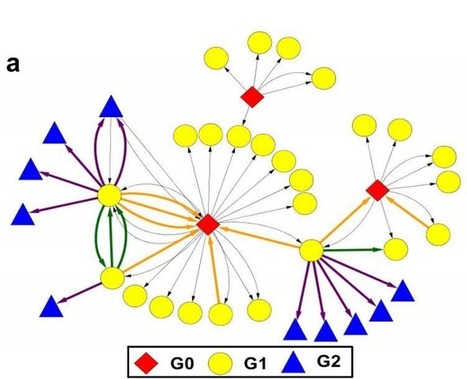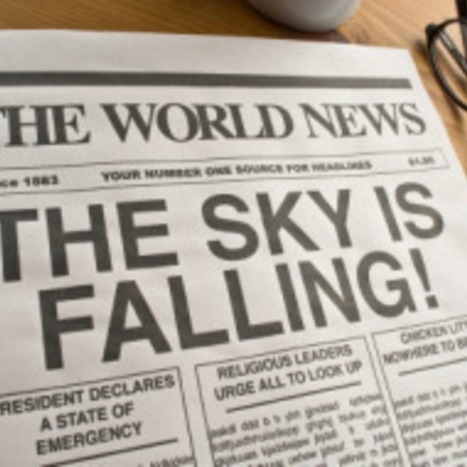 Your new post is loading...
 Your new post is loading...
So how important is it to make sure that your corporate website – and therefore your crisis communications home base – is mobile-friendly? Pretty important.
And I’m not the only one who thinks so, Google thinks so as well.
Google has actually started to penalize websites that don’t provide mobile users with a mobile-friendly experience. This means that, in (and out of) a crisis, if your website is not mobile-friendly, not only are you making it harder for your stakeholders to navigate through your site and easily read your communications, but Google may be penalizing your website’s search engine rankings....
A congressman was caught on surveillance tape kissing a woman (not his wife). His crisis management takes a page out of David Letterman's and Don Draper's playbook.
...Well, so much for that. According to Politico, Rep. McAllister’s staff said the congressman would no longer pursue an investigation into the leaker. It looks like he will have little to hide behind other than the de rigueur “I have let my family down and will try to do better” line.
Mining the mobile phone data from 10 million people over 4 years reveals the subtle changes that occur in the flow of information when disaster strikes, say network scientistsscientists.
...More interesting, however, is what happens next. It’s easy to imagine that the first thing the group of friends and relatives do next is contact other people to spread the news that a disaster has struck.
But instead, the next call they make tends to be straight back to the person involved in the emergency situation. This is completely different to the normal behaviour where the likelihood of returning a call is significantly lower. Indeed, a call made during a concert is less likely than usual to get a call back.
Liang and co conclude that the need for correspondence with eyewitnesses is more critical than the dissemination of situational awareness during emergencies.” In other words, the desire to want to find out more trumps the need to pass on what they already know. At least in emergency situations....
“Many studies have already shown how important crisis management is for organizations,” Hong said. “This study shows that Facebook can be a valuable tool for public relations professionals when working to solve or lessen the severity of a crisis. Because Facebook is very personal for its users, well-thought-out crisis management messages can be effective at reaching users on a personal level, which is a powerful way to persuade people to a cause.”
Hong also found that Facebook posts written in a narrative style were more effective than posts written in a non-narrative format. Narrative style is chronological and focuses more on story-telling rather than fact listing.
“This indicates that the effect of narrative tone in organizational statements during crises increases perceived conversational human voice, which represents a high level of engagement and best communicates trust, satisfaction, and commitment to the audience,” Hong said. “This is an important practice for public relations professionals because perceptions that an organization is sincerely trying to provide timely and accurate information during a crisis can lead to not only more favorable attitudes toward the organization, but also perceptions of less responsibility the organization has for causing the crisis.”...
Twitter‘s tweets-per-second numbers are usually fairly stable, with spikes happening here and there to varying degrees depending on what is trending and happening in the real world. On August 3, however, it had an unusually high per-second tweet peak – so high, in fact, that it set a new record for the social network. Now Twitter has posed the details on what happened complete with some bragging about its user experience.
The flood of tweets originated from Japan during a showing of Castle in the Sky, with viewers so enthused about what they were watching that tweets reached a sort of rapid crescendo, peaking out at 143,199 in a single second. This is in contrast to the average per-second rate the microblogging website sees of 5,700....
Allow me a moment of nostalgia for the classic liveblog. “Liveblogging” was this thing we used to do before the rise of Twitter and Storify, much like good old-fashioned blogging itself. You’d have a host and a bunch of guests all watching the same Web page together, and for an hour or so, they’d make magic.
I should confess: every now and then, I get a hankering for some of that old magic. I pour some good wine, dust off a CoverItLive console, and invite some friends over.* And every time I do, I’m reminded why genuine liveblogging — real-time, browser-based liveblogging — is still one of my favorite instruments in the modern journalism toolkit. I highly recommend it to you, for reasons I outline below. And I’ll also give you some pointers on how to do it....
So, you set out to create a website, accessible to the public, aimed at helping your employees budget. You have hopes of helping them out, but let’s be real here, you’re also looking to grab you some good PR in the process. Once you get started, however, you realize that there is no way a typical employee at your organization makes enough to live on, even with a second job, and leaving out minor expenses like food, water, and clothing…because those are luxury items, right?
Most of us would scrap the project on the spot, but not McDonald’s! The company, which has already run into a few stumbling blocks while getting acquainted with how the modern web works, must not have thought it was a problem because they went live. As could be expected, the company took a beating in the media, largely as result of the buzz generated following video, from the activists at Low Pay is Not Okay:
Just about every plan we put together these days includes aspects of social media crisis management. Presenting a variety of platforms and utilities that are perfect for communications, reputation management, monitoring stakeholder sentiment and a host of other specialized uses.
Add to that the fact that your audience is all but guaranteed to be both talking about and searching for information on your crisis via social media, and the question of whether to use social for your next crisis management campaign becomes a no-brainer.
...Social media disasters occur for a number of reasons, the first being that your company probably messed up. It may not have been intentional, but something, somewhere down the line, went wrong enough for someone to complain and it was enough for others to vocalize that complaint en masse. One mistake is all it takes for social media to turn against your brand.
No one is perfect and you can't expect to please everyone all the time, so the best trick is to be prepared for how to handle things if your company finds itself under attack in the social realm. Here are three examples of companies who were attacked by social media and how they handled, or should have handled the situation. Learn from their mistakes or successes so you can stay on social media's good side....
As I watch this crisis unfold, only 150 miles away from my home in Montreal, there are two things in particular that stand out: the crisis leadership and communications fail of the Chicago-based company that owns the train, Rail World Inc., and the executive Chairman that everyone looked to for leadership, but was no where to be found, Edward Burkhardt.
Rail World Inc.’s crisis communications failThe biggest communications fails are those (crisis communications) that do not exist, and those that come across as insincere and half-assed in a crisis situation.I wish I could report to you that Rail World Inc. had at least utilized social media as a communications tool for communicating with stakeholders, the media and concerned residents of the Lac-Mégantic community, but unfortunately I can’t. The company has zero corporate social presence and I suppose it never occurred to them to create, at the very least, a Twitter account to keep stakeholders updated throughout the crisis....
After one of its planes crash landed into San Francisco, Asiana Airlines issued a press release that didn't even acknowledge the victims.
Happy, Friday. This week's Friday PR Picks and social media missives are loaded with crisis management, content marketing and communication insight.
We're featuring 9 valuable crisis management, 10 public relations posts and 14 must-read social media articles. Perfect for the long weekend.
Food Network, Walmart, Caesars Entertainment…one by one, the many companies represented by Paula Deen are backing out on deals they’ve forged with the celebrity chef. The latest business to wash its hands of Paula Deen? Pharmaceutical company Novo Nordisk.
The bad news continues for fallen idol Paula Deen, who, following allegations of racism, has been losing valuable deals left and right. Whether or not company leaders feel that Paula is actually a racist, they clearly do not wish to be associated with all the bad PR following this case.
|
A few years ago, my team and I were launching a leadership development program for a client. Just before we launched the pilot program, the company was hit with a high-profile scandal. A couple of rogue executives were caught playing around with the company’s finances and millions of dollars went missing. The ensuing scandal rocked this once-great company, leaving its reputation in tatters. The executives were charged.
When we kicked off the pilot session a few months later, the scandal quickly became the elephant in the room. It was clear the participants needed a forum to express their personal views on those events. We could feel their deep-seated anger, and we realized we had to bring it out into the open.
The 5C’s of crisis communications detail the five critical traits all executives and spokespersons must convey during their press conferences and interviews.
One of the smartest things a brand can do is to respond as quickly and intelligently as possible to negative social media publicity, which is exactly what Taco Bell did.
Whether it’s an unsatisfactory customer experience, a management mistake, product malfunction or an employee of a major fast food chain publicly posting photos of themselves licking Tacos there are many reasons a company can get bad publicity.Below, we share with you some simple PR techniques that may well be worth thinking about so that your company is ready when people start talking about you on a blog, Facebook or Twitter....
The key word in social media is social.
As such, it’s a two-way game. Brands and businesses that use channels such as Twitter and Facebook to simply broadcast their message rarely get the sort of results they would expect. Fans and customers want and demand to be heard, and brands that carefully nurture these relationships benefit from higher engagement levels, boosts in website traffic and sales, strong word of mouth marketing and customer loyalty.
But sometimes, despite our best efforts, things go wrong. So what do you do when the worst happens?...
Oprah Winfrey, one of the world’s richest women valued at over 2.9 billion dollars, was refused 3 times the opportunity to examine and purchase a 37 thousand dollar Tom Ford handbag. This happened at a posh upscale boutique in Switzerland.
The resulting news and social media backlash for the boutique involved and Switzerland itself (the country’s tourism office also apologized to her) was rapid and explosive, with negative commentary from news organizations, Facebook, Twitter, media publications and the like chiming in. Don’t be surprised by this! Anything that touches on deeply personal values (racism, gender equality, lifestyle, health, etc.) will quickly mushroom into an immense social media unconscious event. It will either become a social media dream or in this particular case…the ultimate social media brand reputation management nightmare.
This wake up call provides a powerful opportunity for businesses regarding their reputation management process. Not every business has a plan in place and for those who don’t know where to start, consider these 3 compelling reputation management tips....
The bombings at the Boston marathon were a tragic reminder that terrorism can strike anywhere at any time. Business Continuity professionals should be thinking about the effects of a terrorist attack and incorporate those scenarios into their plans.
Here are 5 benefits of using a mobile app for your internal crisis communications - and which industries and types of organizations would best benefit.
Intranets are a great tool for large organizations that have offices all around the country and the world, but what about when you have workers on the ground? Workers on the ground don’t necessarily have a computer in front of them at all times, but what they definitely do have is a mobile phone. Creating an app designed specifically for your internal (crisis) communications will allow you to:- Access and reach each and every member of your team, no matter where they are at any given time – and all at once...
...Edward Burkhardt, CEO of Montreal, Maine & Atlantic Railways waited 5 days before visiting the crash site andmaking a statement to the media. His statement lacks a significant, quotable apology to those affected, while focusing too much on the technical aspects of dealing with insurance, finances and monetary issues. He even begins his statement by defending whether he is a compassionate person.
True, the CEO does not always need to be the spokesperson in every crisis. However, a crisis this big demands an appearance and statement within 24 hours of the onset of the crisis.
True, I believe a CEO should spend more time managing the crisis and running the company than trying to be a spokesperson, but a crisis this big demands at least a few hours to talk with the media and the families who have lost loved ones. News reports indicate that at the time of the news briefing, the CEO had not reached out to families....
Wall Street Journal ran a blog yesterday talking about how bad Asiana’s PR is in the wake of the pilot-induced crash in San Francisco. They made the point that the CEO rebuffed communication experts in the US who wanted to help if the crash aftermath and stuck with its South Korean team. An Asiana representative said, “It’s not the proper time to manage the company’s image.”
That’s quite a remarkable statement. If the hours, minutes, days and weeks following a horrible crash, caused by an inexperienced pilot, is not the proper time to manage a company’s image, when is? The old adage about a crisis representing both risk and opportunity is very true, I believe. Trust can be built despite horrible circumstances, so it does matter greatly....
As with so many other news events, there was plenty of speculation and misinformation flowing on Twitter about the crash of an airplane at San Francisco airport — but for better or worse, that is just the way the news works now.Another breaking news event — in this case, the crash of Asiana Airlines flight 214, which broke apart while landing at San Francisco airport on Saturday morning — sparks more criticism (primarily on Twitter, of course) about how Twitter is a haven for errors and unfounded speculation, and how people seem compelled to retweet things during these events even if they have no knowledge of whether they are true or not.
To some, including regular readers of GigaOM, this won’t come as any surprise. Welcome to the way the news works now.
We saw similar criticisms and debates about the value of Twitter as a news medium during the Boston bombings, Hurricane Sandy, the shootings at Sandy Hook elementary school, and pretty much every other major news event that has happened over the past several years. At some point during the action, someone will complain about how many mistakes there are circulating on Twitter, and others will argue that we should all just refrain from tweeting or retweeting anything — or perhaps just wait until later and buy a newspaper....
Fans had made a to-be-published book by Paula Deen a top seller on Amazon, but the publisher, Random House, joined the list of business partners that have cut ties to the embattled chef....
The book deal was one of the last remaining lucrative business relationships for the embattled celebrity chef. Its cancellation came on a day when Sears, Kmart and J. C. Penney announced that they would stop selling products, including cookbooks, branded with her name. Since last week, the Food Network, Smithfield Foods, Walmart, Target, Caesars Entertainment, QVC and the pharmaceutical company Novo Nordisk have decided to suspend or sever ties with Ms. Deen after her admission in a legal deposition that she had used racist language in the past and allowed racist, sexist, homophobic and anti-Semitic jokes in one of her restaurants. Ms. Deen was deposed on video as part of a discrimination lawsuit filed last year by a former employee....(New York Times)
Last month, a man named Ken Hoinsky added his project to the [Kickstarter] website. He’s a writer who wanted to publish a book on the art of seduction called Above The Game: A Guide to Getting Awesome with Women. He quickly raised more than $16,000.
But some of the advice Hoinsky has dispensed in the past is controversial. Some critics even called his book a “rape manual.”... Many horrified people contacted Kickstarter and asked them to remove his listing. They didn’t. As the outrage understandably intensified, so too did the company’s crisis.
But when Kickstarter finally responded, they did it perfectly. You’ll find Kickstarter’s full apology below, deconstructed to analyze why each part worked so well. It’s a terrific template for a crisis response.
|
 Your new post is loading...
Your new post is loading...
 Your new post is loading...
Your new post is loading...















































Melissa Agnes notes the importance of a mobile-friendly website in a crisis.